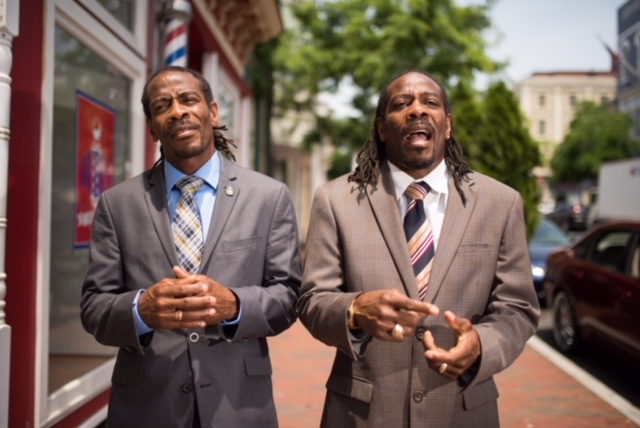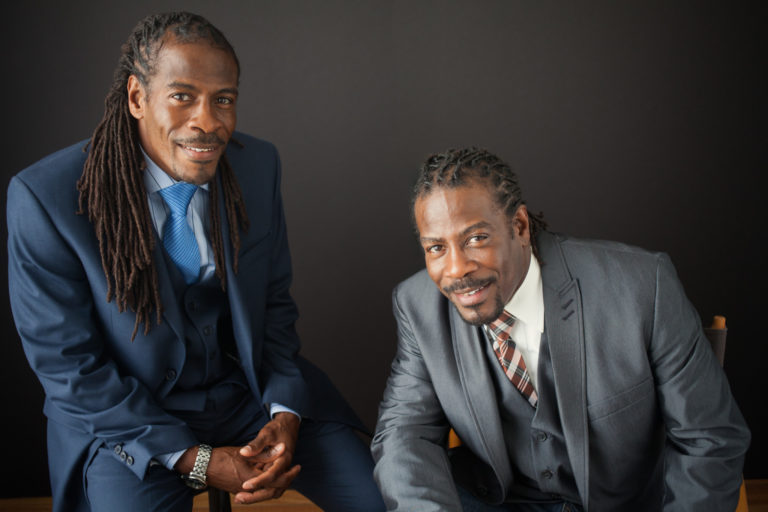One of the most talked-about features of Joe Biden’s presidential inauguration (besides the fact that we managed a peaceful transfer of power) was the performance of original work by 22-year-old poet Amanda Gorman.
In the weeks that followed, it was she, ahead of political power players, who emblazoned the cover of Time. Garbed in her now-signature color of yellow, Gorman is the sun itself. She checks many of the boxes: She is young, Black, and female — a worthy usher for an administration that has promised to be inclusive. But still: Why all this fuss about a poem on a day when Biden signed a dozen executive orders? Was it a diversionary tactic or was Biden showing the country that he intends to amplify voices that have traditionally been absent from the halls of power?

I called identical twin brothers Nnamdi Chukwuocha and Albert Mills — known as The Twin Poets, nationally-recognized spoken word artists as well as political figures within Delaware — to discuss this moment we find ourselves in and glean insights on the intersection of politics and poetry.
Chukwuocha and Mills have all the credentials. Poets from a young age, they have been featured on DEF poetry and are the subjects of the documentary Why I Write. After college and the military (Mills is a veteran of the first Gulf War), the brothers chose to serve the Wilmington community as social workers, working with children of underserved populations to keep them out of trouble whenever possible and, failing that, advocating for them in the juvenile justice system.
In recent years, they have expanded on those spheres of influence. In December 2015, Gov. Jack Markell named them Delaware’s 17th Poets Laureate, a post created to raise awareness of both reading and writing of poetry throughout the state. In addition, Chukwuocha, a former Wilmington city councilman, currently serves as a member of the state House of Representatives, a post he has held since 2018. Mills, too, has been part of the local political conversation with his own run for city council.
If creating art and affecting policy sound like split objectives, the brothers assured me that they are not. “Our art and our social work go hand in hand,” says Chukwuocha “Art is one thing. Our art fuels our actions. It is behind our social work. That is our framework that we address it from.”
Mills agrees and adds that, as Poet Laureate, they have had access to people such as superintendents of schools and places such as classrooms and detention centers where they witnessed needs and policy outcomes first-hand. And, too, the men have enjoyed a receptiveness that comes from having qualifications in two different arenas. “People are more open and willing to listen,” says Mills.
The aforementioned rising star (sun!) of Amanda Gorman hasn’t hurt the cause and the reach of the spoken word, either. Her performance proved that poetry does have a place on the political stage.
“Poetry allows that same parsed message to be accepted,” says Chukwuocha. “It allows the conversation to be heard.”
Mills is excited for another reason. “The attention that [her poem] received afterwards, seeing that interest, that has done so much for our writing groups and our kids who want to write poetry,” he says. “I want to be like Amanda. That’s amazing.”
People are more aware and willing to listen, but has the message changed? Since the brothers first became Poet Laureate in 2015, our country has experienced several brutal election cycles, the heightened cries and demonstrations of Black Lives Matters and #MeToo movements, and a worldwide COVID pandemic that has affected all but placed disproportionate health and economic burdens on the most vulnerable in our society.
Chukwuocha denied these circumstances have altered their artistry.
“Our work is rooted in being a voice for our community,” he said.
This declaration was a common refrain in our conversation, and it is a mantra that can apply to both poetry and politics.
“The outside world has looked at what is happening inside of our community, but our voice hasn’t changed,” Chukwuocha said. “We are still speaking about injustices and things that we would love to see changed, both inside of our community and outside of our community.”
The injustices, Chukwuocha clarified, include gun violence, drugs, mass incarceration of Black men, and poverty. “We have an obligation to speak for those who weren’t allowed to speak and for voices that are currently being silenced…young, Black males inside of correctional institutions or in graveyards.”
The reach of poetry transcends that of metered messaging or community megaphone; the brothers believe poetry is also a communication tool with the power to deescalate violence before it starts. Mills elaborates: “When we had conflicts (growing up), our mother would make us write our brother a letter. It became a way to express our frustrations, and we know that those tools can help with these children today. If they can give voice to their frustrations, that may prevent an argument that leads to the fight that leads to the shooting. We can decrease crime. We can use poetry as conflict resolution, anger management, a means to help these children make better life decisions.”
In May of 2020, The Academy of American Poets recognized the work that Chukwuocha and Mills are doing in Delaware and awarded them a sizable grant to ramp up their efforts. COVID was both a blessing and a curse in trying to launch their proposed program Write Now!, a series of workshops, readings, and service projects focused on youth in communities impacted by gun violence and fellow veterans diagnosed with PTSD.
The brothers had to pivot from in-person to virtual, which removed red tape, in some instances, to be “in the room” with their intended audiences and participants. Almost a year after the award, they are ready to celebrate April’s Poetry Month and showcase the fruits of their endeavors. On Sat., April 24 they will present a hybrid-style poetry festival — part in-person and part virtual.
With this dual showcase and the current national spotlight on poetry, they hope to engage more people of the community than ever before with their chosen art form. The overarching message seems to be this: Poetry, like politics, achieves its highest calling when it promotes dialog and action.
— Visit TwinPoets.org for more on the poetry festival.





